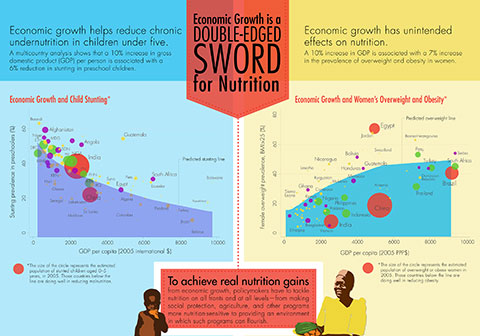Dena Leibman is Head of Outreach at IFPRI.
As nutrition experts from around the world gather in London to ask G8 leaders to take bold action to fight malnutrition, The Lancet, one of the world’s premier medical journals, is informing the debate with the release of its long-awaited series on maternal and child undernutrition. The series—drawing from and updating years of hard work by nutrition researchers, economists, and other nutrition champions—provides grim new estimates of the numbers of children dying from malnutrition every year, 3.1 million, but also lays out strategies that, if enacted by world leaders, offer hope.
IFPRI is proud that two of the series’ four papers are authored by IFPRI researchers. Paper 3—written by lead author Marie Ruel, division director of IFPRI’s Poverty, Health, and Nutrition Division, and Harold Alderman, IFPRI senior research fellow—discusses that key to fighting malnutrition is designing broad development programs that are nutrition sensitive. When agriculture, social protection, early child development, education, water and sanitation, and other programs address nutrition, they address the wider drivers of malnutrition—such as income, food security, women’s empowerment, and diet quality. This offers huge benefits for improving nutrition and lives. Such broad, nutrition-sensitive programs can also be vehicles for more direct action, such as ensuring that schools offer nutrition curricula.
Says Ruel, “Improving the nutrition sensitivity of programs in a range of sectors is essential to increase the scale, coverage, and impact of nutrition interventions and to allow development programs to achieve their own goals.”
Stuart Gillespie, senior research fellow at IFPRI, is the co-lead author of Paper 4, along Lawrence Haddad of the Institute for Development Studies (IDS). Gillespie and Haddad—and co-authors Purnima Menon, IFPRI senior research fellow; Venkatesh Mannar of the Micronutrient Initiative; and Nick Nisbett of IDS—researched and wrote about building the right political environment in which such interventions as nutrition-sensitive and nutrition-specific programs can thrive. Key to creating such an enabling environment, says Gillespie, is “sound evidence and dynamic leadership, underpinned by strengthened institutional capacity. With these elements, a lasting political commitment can be forged, generating lifelong benefits for millions of women and children currently at risk of illness or death arising from malnutrition.”
The Lancet 2013 series is a follow up from the journal’s seminal nutrition series in 2008, which led to the Scaling Up Nutrition (SUN) movement and the creation of a policy framework emphasizing the importance of a child’s first 1000 days of nutrition. Research gathered in developing the 2013 series, as well as other recent efforts, has been used to inform the SUN framework and in two weeks, the world’s leaders will be asked to pledge action to a set of pro-nutrition actions. The Lancet series provides a cornerstone of these proposed actions.
The graphic shows us that economic growth is a double-edged sword, and not enough to achieve real nutrition gains. Policymakers also must tackle nutrition on all fronts and at all levels—from making social protection, agriculture, and other programs more nutrition-sensitive to providing an environment in which such programs can flourish.
Download infographic based on IFPRI research in The Lancet series







